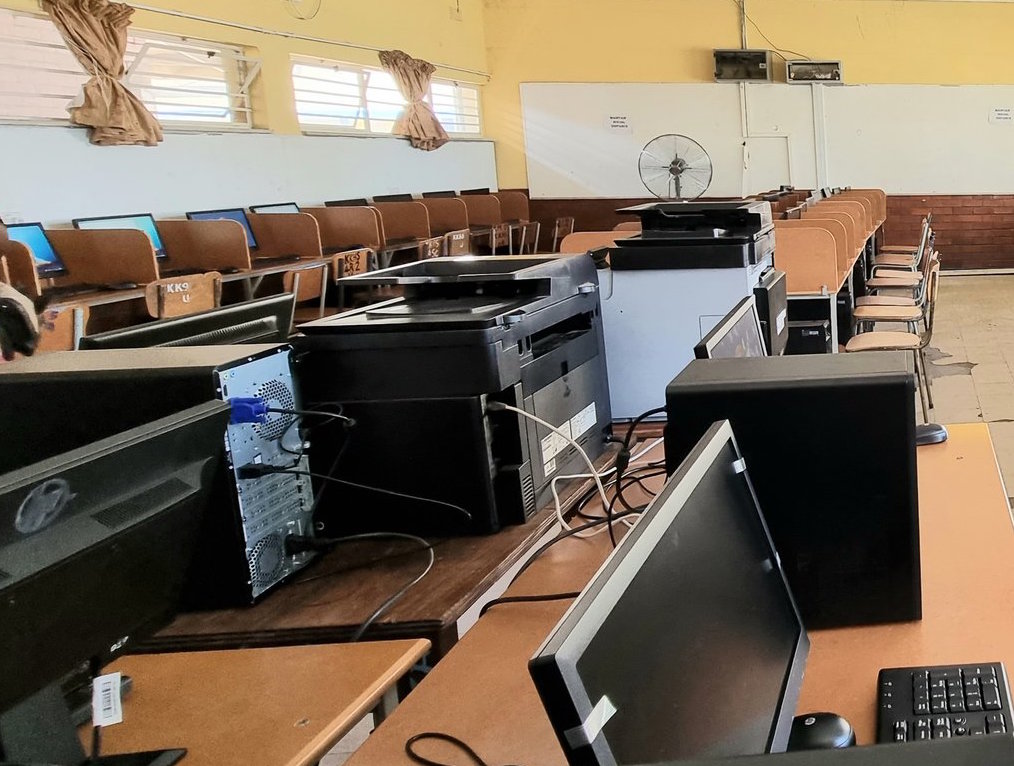|
Getting your Trinity Audio player ready...
|
Dr. Jenfan Muswere, the Minister of Information Communication Technology (ICT), Postal and Courier Services is leaving no stone unturned in his quest to bridge the digital divide countrywide.
Yesterday, the minister commissioned and launched three Public Finance Management Kiosks and six school Information Communication Technology Laboratories in the Midlands Province.
That augurs well with President Mnangagwa’s vision wherein he identified national goals that are aimed at stimulating growth. One of the goals is to facilitate universal access to ICTs by 2030 and the National Development Strategy (NDS 1) that seeks to provide ICTs and digital access at the village level. In support of NDS 1, the ICT sector’s core business is to ensure the connection of the unconnected.
“Our Ministry fully facilitates ubiquitous connectivity through the provision of infrastructure and support systems. The success of any nation is founded on the skills and knowledge of that nation’s people. As the world evolves and transitions towards the ICT based 4th industrial revolution it is implicit that the nations that will succeed will be those nations with a wide ICT knowledge base. The equipping of schools with ICT infrastructure is thus an important foundation to ensure that Zimbabwe will fully be part of the 4th industrial revolution.
“As we digitize our schools, we are mindful of the mandate given to us by His Excellency President E. D. Mnangagwa to leave no one behind in the digital age. The location or status of a school will therefore never deter us from equipping a school; we are going to reach every corner of Zimbabwe to fulfil our President’s vision of leaving no one behind,” Minister Muswere said.
The ICT Ministry is working hard to set up and operationalize Public Finance Management Kiosks all over Zimbabwe to ensure that all civil servants have access to all Public Finance Data from the comfort of their work districts. This access is a true decentralization and devolution of Government.
In addition, the ICT training given to civil servants in the rollout of kiosks will ensure that the kiosks do not turn into white elephants.
Today, the Minister addressed Judges from the country’s superior courts who were undergoing a training in ICT. The legal field is always evolving with technology being the key stimulant in causing this evolution.
“As the world evolves, we must also evolve and adapt to new ways of performing tasks in our various areas of expertise. The covid-19 pandemic exposed to all and sundry that there was an urgent need for us to embrace technology if we truly hoped to continue functioning without interruption.
“I am pleased to note that Zimbabwe’s judiciary has been a pacesetter in adopting the use of technology to administer justice. While the Integrated Electronic Case Management System will only be launched on 1 May 2022 it is common cause that almost all judges of the superior courts have received e-skills training. This e-skills training will see the judiciary ready to navigate the new Integrated Electronic Case Management System laden with features such as e-filing and virtual sittings of the courts. This state of affairs is evidence of a judiciary that is ready to evolve and adapt to new technology,” Minister Muswere said.
He was hopeful that ICT skills gained by the judges will not only benefit them but will benefit all litigants who beseech the courts and chambers seeking justice. The e-skills training will ensure that the justice system and all its stakeholders are not left behind in the digital age.






